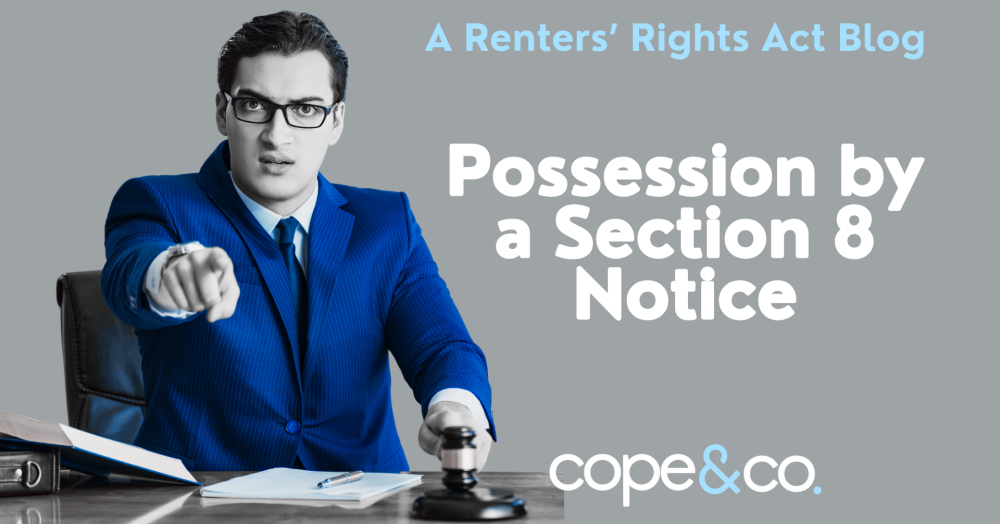
Section 8 Is Changing – Here's What Landlords Need to Know
The way landlords regain possession is about to change dramatically. Section 21 is out. In its place, Section 8 is being reshaped to become the main legal route for ending a tenancy - but with more restrictions, longer notice periods and tougher evidential standards. This isn’t a minor tweak. It’s a major shift in how possession works - get ready..
Section 8 is about to take centre stage. With the end of Section 21 on the horizon, landlords will soon need a solid legal ground - and a strong audit trail with plenty of evidence - every time they want to end a tenancy. The Renters’ Rights Bill is bringing big changes to how and when possession can be regained, and Section 8 is being tightened up to reflect a more regulated, court-led approach. Here’s what you need to know and how to stay one step ahead.

What Is Section 8 - and Why Does It Matter Now?
Section 8 allows landlords to evict tenants when there's a specific reason - whether it’s serious rent arrears, antisocial behaviour, selling up, or needing to move back in.
There are two types of grounds under Section 8. They define how much control the judge has over the final decision.
Mandatory grounds
A mandatory ground means the court must grant possession; provided the landlord can prove the claim. There’s no leeway or interpretation involved. If the evidence holds up, eviction is automatic.
Discretionary grounds
A discretionary ground gives the judge more flexibility - even if the landlord can prove the claim. The court will weigh up the facts and may decide not to evict, even if the tenant has breached the agreement. Judges often consider factors like the tenant’s personal circumstances, repayment efforts, or whether the issue has been resolved.
Under the new proposals, these grounds are staying - but the way they’re used is getting a serious overhaul.

The Big Changes to Section 8 Grounds
Here’s what’s coming down the track:
Longer Notice Periods for Sale or Moving Back In
The notice period is increasing from 2 months to 4 months. Also, you won’t be able to use these grounds at all in the first 12 months of a tenancy. This gives tenants a year of protection before a landlord can reclaim the property for sale or personal use.
New Restrictions on Re-Letting After a Sale Notice
Once a landlord gives notice to sell, they’ll have to wait 16 months before the property can be re-let. That includes 4 months' notice plus a 12-month no-letting period - even if the property doesn’t sell. Breaking this rule can result in serious penaties.
This stops landlords from serving notice to sell and then deciding to re-let. It’s a hard commitment.
Tougher Rules for Rent Arrears
Landlords will only be able to act if tenants are three months in arrears. Even then, the notice period is being extended from 2 to 4 weeks.
In reality, most landlords could lose 4+ months’ rent before they’re allowed to start possession proceedings.
Antisocial Behaviour – Still Fast-Tracked
If you have clear evidence of antisocial behaviour, you can still act immediately. But, you’ll need to prove it beyond doubt. Vague complaints won’t be enough.

What This Means for Landlords
The era of quick and easy evictions is coming to an end. Every possession claim will now require:
🔹 A valid legal ground
🔹 Detailed evidence
🔹 Court approval
Landlords who don’t have solid documentation or a compliant tenancy setup will find themselves stuck.
Those relying on the sale or personal-use grounds will also need to plan carefully. If the sale falls through, the property can’t just be re-let or turned into a holiday let. It will have to sit empty - potentially for months.
More Time, More Risk: Financial Implications
Longer notice periods mean longer voids. Add in potential court delays and legal fees, and landlords could be exposed to:
🔹 4–6 months of lost rent
🔹 Higher legal costs
🔹 Extended periods of uncertainty
This makes rent protection insurance and strong affordability checks more important than ever.

What About Tenants?
For tenants, these reforms bring:
- Greater security – they’ll have at least four months' notice (or more) in most cases.
- A right to challenge – landlords must prove their case in court.
- Faster action against antisocial tenants – with no minimum notice if the behaviour is proven.
Overall, the goal is a fairer system where good tenants are protected, and bad behaviour is dealt with decisively. The reality remains to be seen.
How Landlords Can Prepare Now
The law isn’t final yet - but waiting until it is would be a mistake. Smart landlords are already getting ready. Here’s what we recommend:
✅ Review your tenancy process
Stronger affordability checks, better tenant vetting, and more robust tenancy agreements are essential.
✅ Know your grounds
Make sure you understand how and when each Section 8 ground applies - especially the timelines.
✅ Keep excellent records
Everything from late rent reminders to inspection notes should be documented and timestamped.
✅ Check your insurance
Does your rent protection policy cover legal costs under Section 8? Now’s the time to find out.
✅ Work with an expert agent
Managing tenancies alone in this new world is risky. The right letting agent can keep you compliant, informed, and ahead of the curve. And that is Cope & Co.

Final Thoughts
Section 8 reforms mark a new chapter for landlords - a more regulated, court-led system where preparation, paperwork, and professionalism will be everything.
At Cope & Co., we’re already helping landlords navigate these changes. Whether it’s reviewing your current tenancies, tightening your documentation, or switching to a fully managed service - our job is to make sure you’re ready for what’s next.
Because when the rules change, the best thing you can do... is change gear with them.












